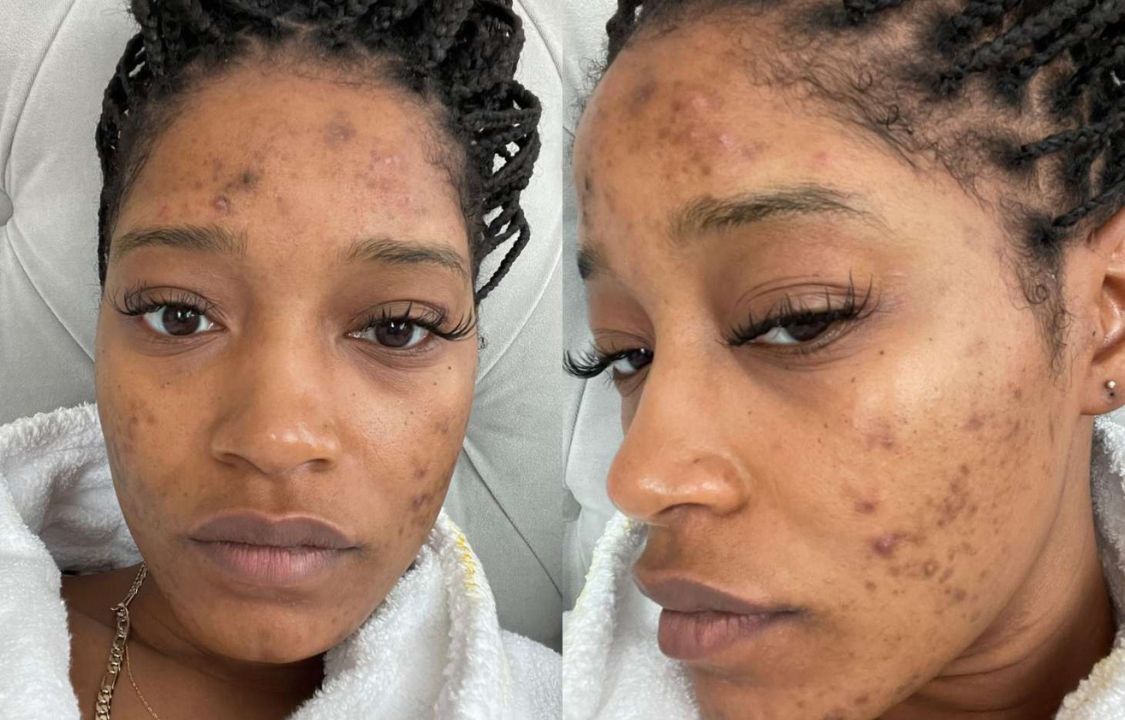Insight
Keke Palmer Just Got Real About Her PCOS and the Acne Caused By It—Here’s What to Know
“[PCOS] has been attacking me from the inside out my entire life and I had no idea.”
Actress and singer Keke Palmer, who made history earlier this year as the first Black woman to host the MTV Video Music Awards solo, recently opened up about her battle with polycystic ovary syndrome (PCOS). PCOS is a prevalent health issue resulting from hormonal imbalances that affect the ovaries, as noted by the Office on Women’s Health (OWH).
In an Instagram post, the 27-year-old Palmer bravely began, “Hey you guys, for some of you this may be TMI, but for me, my platform has always been used for things much greater than me.” She candidly shared her ongoing struggle with PCOS, a condition that had been silently affecting her throughout her life, unbeknownst to her until recently.
Accompanying her heartfelt words were makeup-free selfies revealing her struggle with acne, one of the common symptoms of PCOS. Palmer disclosed, “My acne has been so bad that people in my field offered to pay for me to get it fixed.” She went on to explain that she had tried “everything” to combat her skin issues, from taking Accutane (isotretinoin, a commonly prescribed oral medication for acne) to maintaining a healthy diet and staying hydrated.
Palmer’s initial blood tests yielded no significant findings, leading her to delve into her family’s medical history. With a family background marked by diabetes and obesity, she realized that her health concerns might be tied to her genetic predisposition. Unfortunately, she found that some medical professionals overlooked her condition because she didn’t fit their preconceived notions of what a PCOS patient should “look like.” In frustration, she shared an incident where a doctor’s response to her tearful plea was a recommendation for a measles vaccine, highlighting the importance of advocating for oneself in the medical journey.
The acclaimed actress further revealed that her skin issues had caused her many nights of sadness, but she remained resilient. She asserted, “I know this is not me, and my body has been looking for help.” Palmer’s story underscores the crucial role of self-advocacy in obtaining proper healthcare, as she took it upon herself to research and present her findings to a doctor, ultimately leading to a correct diagnosis. She emphasized the idea that no one can advocate for your health as effectively as you can for yourself.
Palmer also shared her family’s struggles, recounting years of inadequate medical attention and even being misled by healthcare professionals. She acknowledged the sacrifices her family had made, which enabled her to have the resources and knowledge to share her experiences with the world. Her intent was clear—to use her platform to raise awareness about PCOS and encourage others to be proactive in seeking medical answers.
While the photos shared by Palmer vividly depicted the extent of her acne, she emphasized that this was only one aspect of PCOS’s impact on her health. PCOS is a syndrome characterized by a spectrum of symptoms that can vary from person to person. Its name, polycystic ovary syndrome, refers to the small cysts that can form on a woman’s ovaries due to hormonal imbalances.
In addition to severe acne, PCOS symptoms encompass irregular or infrequent periods, abnormally heavy menstrual bleeding, unwanted facial and body hair growth (hirsutism), and weight gain. It’s important to note that PCOS can affect individuals of all body types, dispelling the misconception that it only impacts those who are overweight.
About 10% of women between the ages of 15 and 44 will receive a PCOS diagnosis, according to the OWH. Diagnosing PCOS typically involves a physical examination, pelvic ultrasound, and blood tests, especially when there is suspicion of the condition. An official diagnosis typically requires the presence of at least two of the following criteria: irregular periods, elevated androgen levels, hirsutism, acne, scalp hair thinning, and multiple cysts on one or both ovaries.
PCOS can pose significant challenges, including difficulties with fertility, an increased risk of endometrial cancer, and the development of insulin resistance, diabetes, and cardiovascular diseases. Early awareness of the possible symptoms is crucial, as it can lead to prompt diagnosis and intervention.
Palmer concluded her heartfelt Instagram post with words of profound encouragement and empathy, aimed at providing solace and strength to those who find themselves in the relentless battle against PCOS. She wanted to ensure that they understand they are never alone in their struggles and that their inherent beauty shines through, undiminished, despite the daunting challenges they face daily.
With unwavering determination, Palmer underscored the resilience she has shown in the face of her own acne, highlighting that it has never hindered her progress or held her back from pursuing her dreams. Yet, she also underscored the critical importance of not succumbing to defeat in the face of PCOS, emphasizing that it’s not an insurmountable obstacle but rather a hurdle that can be overcome.
Palmer fervently pledged to take proactive measures to manage and combat her condition, passionately urging others to embark on their own journeys of healing and self-improvement. In a gesture of immense self-love and solidarity, she expressed her boundless love and unwavering support for herself, serving as an inspiring example for all.
In her closing statements, Palmer humbly reached out to her followers, beseeching them to offer their prayers for her on her challenging journey, promising in return to uplift them in their own times of need. She earnestly urged everyone not to shy away from revealing their authentic selves to the world, fostering a profound message of self-acceptance and empowerment in the face of formidable health challenges such as PCOS. Palmer’s words resonate as a beacon of hope, radiating positivity and unity within her community of followers.

